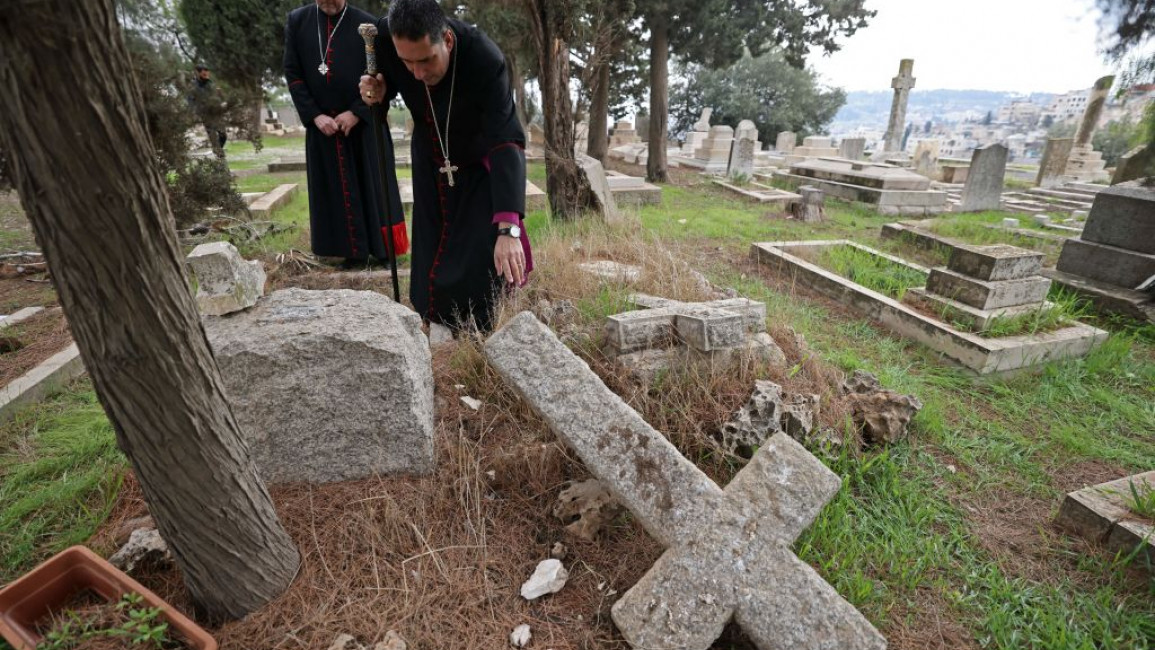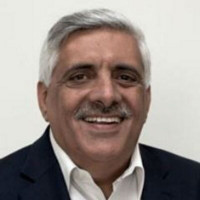
Jewish extremist attacks on Christians in Palestine are a symptom of Israel's government
One of the most toxic mixes in the world is the combination of religious fanaticism with extreme nationalism. In short, this has been the major problem that has caused the continued denial of the rights of the Palestinian people living on their land.
The current Israeli government crowded with zealous national religious Jewish cabinet ministers has been causing worry not only to Palestinians in the occupied territories but also to Palestinian citizens of Israel. This is seen in recent attempts by a Jewish zealous group to lay claim to a Christian monastery in Haifa claiming it is built on the remains of a Jewish prophet.
According to Church leaders, the problems stems from followers of “Shuvu Banim” yeshiva, which is led by Rabbi Eliezer Berland, (a convicted sex offender) who is associated with the Breslov Hasidic stream. The situation has become troublesome in recent months because of a deterioration of trust as Jewish national fanatics appear to be taking over the government of Israel.
''The church has now been forced to erect metal gates at the entrance of the church to bar any uninvited visitors. They see the continued attacks on Christians in Jerusalem and other locations as part and parcel of the deterioration of law and order by Israeli officials when it comes to Jewish violence against Christians.''
Wadie Abu Nassar a Haifa resident and an advisor to Catholic church leaders told The New Arab that the issue is the Israeli government’s attitude: “The problem is not with fanatic Jews, but with the state, which is failing to deter them, while many believe those are somehow encouraged by some members of the current Israeli coalition”.
A history of weaponising religion
When the state of Israel was established in 1948, the Zionist movement was led by secular Jews who used religion to advance their goals but did not appear to be beholden to extreme religious fanatics. This began to change after the Israeli occupation in 1967 as a messianic cult began to appear and push for the implementation of extreme Jewish national goals and aspirations.
Israeli leaders along with the relatively moderate religious rabbis knew that Jerusalem’s Al Aqsa Mosque was a ticking bomb and as a result issued a religious edict banning Jewish entry to Islam’s third holiest mosques. Signed by two of Israel’s top rabbis shortly after the 1967 occupation, it was declared that Jews were not to enter the esplanade which they call the Temple Mount. Doing so in any part of the esplanade could mean defying the holy place.
But this did not deter religious fanatics who decided to flex their muscles in the Palestinian town of Hebron. Led by Jewish rabbi Moshe Levinger and his wife, the fanatic couple rented a hotel room in Hebron and thus began the Jewish settlement campaign that has resulted in the establishment of the 5,000-strong Jewish settlement of Kiryat Arba and the division (by space and time) of the Ibrahimi Mosque to allow for Jewish control and prayer at the site where prophets holy to Jews, Christians, and Muslims are said to be buried.
Jewish fanatics are now trying to do the same in Al Aqsa as more radical Jewish rabbis have negated the earlier ban by arguing that despite the possibility of the remnant of the Jewish tradition could be under the mosque’s 144 dunum area, some parts of the mosque can be visited.
This began a daily procession of visits primarily by fanatic Jews during the visiting hours that the Jordanian-controlled Islamic Mosque allows for non-Muslim visitors. Naturally, these visitors who use the Mughrabi gate (the only gate solely controlled by the Israelis) are not simple tourists or visitors but religious zealots who consider the visit a form of laying claim to the Islamic site.
While many feel that this Jewish fanaticism is restricted mostly to Hebron, Jerusalem, and other parts of the occupied territories, the people of Haifa were surprised to realise that this danger is closer to home.
A Jewish group of followers associated with the Jewish Breslov Hasidic movement began visiting the Stella Maris Catholic Church on Haifa’s Carmel Mountain. Initially, few paid attention to the Jewish ‘tourists’ but when it was repeated, some including Haifa resident and Christian activist, Abu Nassar, began to research the issue and realised that the so-called visitors belong to a Jewish movement that considers that the Christian church is built at the ruins of the grave of a prophet of the Jewish Bible Elisha. According to the Old Testament, the prophet Elisha (who is also revered by Christians) carried out a miracle on the mountain.
What Abu Nassar and the priests at the church feared was that these apparent innocent visits would turn into Jewish claims and eventually an attempt to demand a share and even the possibility of laying claim to the location. The examples of Hebron’s Ibrahimi Mosque and Jerusalem’s Al Aqsa are very much vivid in people’s minds.
A social media video created by Abu Nassar brought hundreds of supporters to the Haifa church including Arab members of Knesset. They demanded that the pro-settler Netanyahu government act against the Jewish visitors.
The Stella Maris church and monastery have a symbolic significance for their beauty and age but also for their connection to the area. It is the home base for the ancient Catholic order known as the Carmelites. Each year, thousands of Christians ascend to Stella Maris in a ceremonial procession and hundreds of foreign tourists visit the church each month.
Christians at Stella Maris are concerned that the Jewish ‘visitors’ wanted to enter the church despite a prohibition in halacha, Jewish Orthodox law, against setting foot inside a non-Jewish house of worship. Church leaders and Palestinians visiting the church in solidarity are worried that the Breslov ‘pilgrimages’ represent the possible beginning of an attempt at dominance rather than worship.
A call for solidarity visits led to hundreds of people gathering in protest at the Stella Maris Monastery in June.
The Israeli media has said that the Breslov followers are “seen locally as provocateurs bent on intimidating Arabs,” while quoting what it called the 'Jewish pilgrims’ as saying that “they merely want to worship outside what they believe is the burial place of Prophet Elisha, a biblical figure from the eighth century BCE and the disciple and successor of Elijah.”
The church has now been forced to erect metal gates at the entrance of the church to bar any uninvited visitors. They see the continued attacks on Christians in Jerusalem and other locations as part and parcel of the deterioration of law and order by Israeli officials when it comes to Jewish violence against Christians. Church leaders have been spat upon, and denied visits to various locations while wearing their cross and the Israeli police appears to have paid little attention to the violence of Jewish hooligans destroying Christian churches and cemeteries.
For the time being it seems that public support has put a temporary stop to the fears of the church, but no one is letting down their guard for now. A visit by the Israeli president along with the chief of the Israeli police resulted in a decision by the radical Hassidic rabbi to instruct his followers to refrain from visits to the Haifa monastery.
Abu Nassar is saying that the police is already approaching the church with offers to find a nearby location for the followers of the Hassidic radical Rabbi. The churches and the mayor of Haifa have so far refused to negotiate on this issue. The question remains whether this refrain by the radical rabbi is a temporary decision, or a permanent one.
Daoud Kuttab is an award-winning Palestinian journalist from Jerusalem. He is a former Ferris Professor of Journalism at Princeton University.
Follow him on Twitter @daoudkuttab and threads @daoud.kuttab
Have questions or comments? Email us at: editorial-english@newarab.com
Opinions expressed in this article remain those of the author and do not necessarily represent those of The New Arab, its editorial board or staff.




